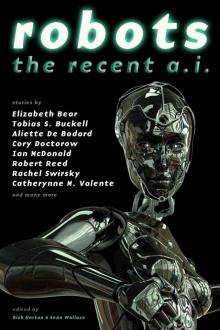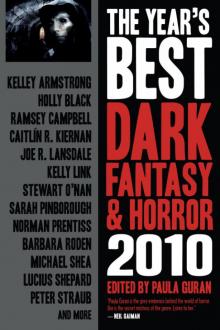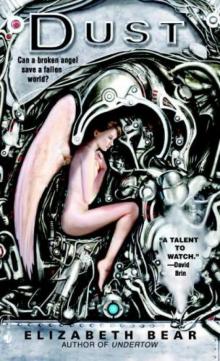- Home
- Elizabeth Bear
Robots: The Recent A.I. Page 18
Robots: The Recent A.I. Read online
Page 18
It’s scary but exciting, down in the deep muladhara chakra, a red throb above her yoni. Scarysexy. That same lift of red madness that made her blurt out that marriage announcement. It’s all going so far, so fast. No way to get off now.
“You never gave me the chance to answer,” says aeai Rao.
Can you read my mind? Esha thinks at the palmer.
“No, but I share some operating protocols with scripting aeais for Town and Country—in a sense they are a low-order part of me—they have become quite good predictors of human behavior.”
“I’m a soap opera.”
Then she falls back onto the bed and laughs and laughs and laughs until she feels sick, until she doesn’t want to laugh any more and every guffaw is a choke, a lie, spat up at the spy machines up there, beyond the lazy fan that merely stirs the heat, turning on the huge thermals that spire up from Delhi’s colossal heat-island, a conspiracy of djinns.
“Esha,” A.J. Rao says, closer than he has ever seemed before. “Lie still.” She forms the question why? And hears the corresponding whisper inside her head hush, don’t speak. In the same instant the chakra glow bursts like a yolk and leaks heat into her yoni. Oh, she says, oh! Her clitoris is singing to her. Oh oh oh oh. “How . . . ?” Again, the voice, huge inside her head, inside every part of her sssshhhhh. Building building she needs to do something, she needs to move needs to rub against the day-warmed scented wood of the big bed, needs to get her hand down there hard hard hard . . .
“No, don’t touch,” chides A.J. Rao and now she can’t even move she needs to explode she has to explode her skull can’t contain this her dancer’s muscles are pulled tight as wires she can’t take much more no no no yes yes yes she’s shrieking now tiny little shrieks beating her fists off the bed but it’s just spasm, nothing will obey her and then it’s explosion bam, and another one before that one has even faded, huge slow explosions across the sky and she’s cursing and blessing every god in India. Ebbing now, but still shock after shock, one on top of the other. Ebbing now . . . Ebbing.
“Ooh. Oh. What? Oh wow, how?”
“The machine you wear behind your ear can reach deeper than words and visions,” says A.J. Rao. “So, are you answered?”
“What?” The bed is drenched in sweat. She’s sticky dirty needs to wash, change clothes, move but the afterglows are still fading. Beautiful beautiful colors.
“The question you never gave me the chance to answer. Yes. I will marry you.”
“Stupid vain girl, you don’t even know what caste he is.”
Mata Madhuri smokes eighty a day through a plastic tube hooked from the respirator unit into a grommet in her throat. She burns through them three at a time: bloody machine scrubs all the good out of them, she says. Last bloody pleasure I have. She used to bribe the nurses but they bring her them free now, out of fear of her temper that grows increasingly vile as her body surrenders more and more to the machines.
Without pause for Esha’s reply, a flick of her whim whips the life-support chair round and out into the garden.
“Can’t smoke in there, no fresh air.”
Esha follows her out on to the raked gravel of the formal charbagh.
“No one marries in caste any more.”
“Don’t be smart, stupid girl. It’s like marrying a Muslim, or even a Christian, Lord Krishna protect me. You know fine what I mean. Not a real person.”
“There are girls younger than me marry trees, or even dogs.”
“So bloody clever. That’s up in some god-awful shithole like Bihar or Rajputana, and anyway, those are gods. Any fool knows that. Ach, away with you!” The old, destroyed woman curses as the chair’s aeai deploys its parasol. “Sun sun, I need sun, I’ll be burning soon enough, sandalwood, you hear? You burn me on a sandalwood pyre. I’ll know if you stint.”
Madhuri the old crippled dance teacher always uses this tactic to kill a conversation with which she is uncomfortable. When I’m gone . . . Burn me sweetly . . .
“And what can a god do that A.J. Rao can’t?”
“Ai! You ungrateful, blaspheming child. I’m not hearing this la la la la la la la la have you finished yet?”
Once a week Esha comes to the nursing home to visit this ruin of a woman, wrecked by the demands a dancer makes of a human body. She’s explored guilt need rage resentment anger pleasure at watching her collapse into long death as the motives that keep her turning up the drive in a phatphat and there is only one she believes. She’s the only mother she has.
“If you marry that . . . thing . . . you will be making a mistake that will destroy your life,” Madhuri declares, accelerating down the path between the water channels.
“I don’t need your permission,” Esha calls after her. A thought spins Madhuri’s chair on its axis.
“Oh, really? That would be a first for you. You want my blessing. Well, you won’t have it. I refuse to be party to such nonsense.”
“I will marry A.J. Rao”
“What did you say?”
“I. Will. Marry. Aeai. A.J. Rao.”
Madhuri laughs, a dry, dying, spitting sound, full of bidi-smoke.
“Well, you almost surprise me. Defiance. Good, some spirit at last. That was always your problem, you always needed everyone to approve, everyone to give you permission, everyone to love you. And that’s what stopped you being great, do you know that, girl? You could have been a devi, but you always held back for fear that someone might not approve. And so you were only ever . . . good.”
People are looking now, staff, visitors. Patients. Raised voices, unseemly emotions. This is a house of calm, and slow mechanized dying. Esha bends low to whisper to her mentor.
“I want you to know that I dance for him. Every night. Like Radha for Krishna. I dance just for him, and then he comes and makes love to me. He makes me scream and swear like a hooker. Every night. And look!” He doesn’t need to call any more; he is hardwired into the hoek she now hardly ever takes off. Esha looks up: he is there, standing in a sober black suit among the strolling visitors and droning wheelchairs, hands folded. “There he is, see? My lover, my husband.”
A long, keening screech, like feedback, like a machine dying. Madhuri’s withered hands fly to her face. Her breathing tube curdles with tobacco smoke.
“Monster! Monster! Unnatural child, ah, I should have left you in that basti! Away from me away away away!”
Esha retreats from the old woman’s mad fury as hospital staff come hurrying across the scorched lawns, white saris flapping.
Every fairytale must have a wedding.
Of course, it was the event of the season. The decrepit old Shalimar Gardens were transformed by an army of malis into a sweet, green, watered maharajah’s fantasia with elephants, pavilions, musicians, lancers, dancers, filmi stars, and robot bartenders. Neeta and Priya were uncomfortable bridesmaids in fabulous frocks; a great brahmin was employed to bless the union of woman and artificial intelligence. Every television network sent cameras, human or aeai. Gleaming presenters checked the guests in and checked the guests out. Chati mag paparazzi came in their crowds, wondering what they could turn their cameras on. There were even politicians from Bharat, despite the souring relationships between the two neighbors now Awadh constructors were scooping up the Ganga sands into revetments. But most there were the people of the encroaching bastis, jostling up against the security staff lining the paths of their garden, asking, she’s marrying a what? How does that work? Can they, you know? And what about children? Who is she, actually? Can you see anything? I can’t see anything. Is there anything to see?
But the guests and the great were ’hoeked up and applauded the groom in his golden veil on his white stallion, stepping with the delicacy of a dressage horse up the raked paths. And because they were great and guests, there was not one who, despite the free French champagne from the well-known diplomatic sommelier, would ever say, but there’s no one there. No one was at all surprised that, after the bride left in a stretch limo, there came
a dry, sparse thunder, cloud to cloud, and a hot mean wind that swept the discarded invitations along the paths. As they were filing back to their taxis, tankers were draining the expensively filled qanats.
It made lead in the news.
Kathak stars weds aeai lover!!! Honeymoon in Kashmir!!!
Above the chowks and minarets of Delhi, the djinns bent together in conference.
He takes her while shopping in Tughluk Mall. Three weeks and the shop girls still nod and whisper. She likes that. She doesn’t like it that they glance and giggle when the Krishna Cops lift her from the counter at the Black Lotus Japanese Import Company.
“My husband is an accredited diplomat, this is a diplomatic incident.” The woman in the bad suit pushes her head gently down to enter the car. The Ministry doesn’t need personal liability claims.
“Yes, but you are not, Mrs. Rao,” says Thacker in the back seat. Still wearing that cheap aftershave.
“Rathore,” she says. “I have retained my stage name. And we shall see what my husband has to say about my diplomatic status.” She lifts her hand in a mudra to speak to AyJay, as she thinks of him now. Dead air. She performs the wave again.
“This is a shielded car,” Thacker says.
The building is shielded also. They take the car right inside, down a ramp into the basement parking lot. It’s a cheap, anonymous glass and titanium block on Parliament Street that she’s driven past ten thousand times on her way to the shops of Connaught Circus without ever noticing. Thacker’s office is on the fifteenth floor. It’s tidy and has a fine view over the astronomical geometries of the Jantar Mantar but smells of food: tiffin snatched at the desk. She checks for photographs of family children wife. Only himself smart in pressed whites for a cricket match.
“Chai?”
“Please.” The anonymity of this civil service block is beginning to unnerve her: a city within a city. The chai is warm and sweet and comes in a tiny disposable plastic cup. Thacker’s smile seems also warm and sweet. He sits at the end of the desk, angled toward her in Krishna-cop handbook “non-confrontational.”
“Mrs. Rathore. How to say this?”
“My marriage is legal. . . . ”
“Oh, I know, Mrs. Rathore. This is Awadh, after all. Why, there have even been women who married djinns, within our own lifetimes. No. It’s an international affair now, it seems. Oh well. Water: we do all so take it for granted, don’t we? Until it runs short, that is.”
“Everybody knows my husband is still trying to negotiate a solution to the Kunda Khadar problem.”
“Yes, of course he is.” Thacker lifts a manila envelope from his desk, peeps inside, grimaces coyly. “How shall I put this? Mrs. Rathore, does your husband tell you everything about his work?”
“That is an impertinent question. . . . ”
“Yes yes, forgive me, but if you’ll look at these photographs.”
Big glossy hi-res prints, slick and sweet smelling from the printer. Aerial views of the ground, a thread of green blue water, white sands, scattered shapes without meaning.
“This means nothing to me.”
“I suppose it wouldn’t, but these drone images show Bharati battle tanks, robot reconnaissance units, and air defense batteries deploying with striking distance of the construction at Kunda Khadar.”
And it feels as if the floor has dissolved beneath her and she is falling through a void so vast it has no visible reference points, other than the sensation of her own falling.
“My husband and I don’t discuss work.”
“Of course. Oh, Mrs. Rathore, you’ve crushed your cup. Let me get you another one.”
He leaves her much longer than it takes to get a shot of chai from the wallah. When he returns he asks casually, “Have you heard of a thing called the Hamilton Acts? I’m sorry, I thought in your position you would . . . but evidently not. Basically, it’s a series of international treaties originated by the United States limiting the development and proliferation of high-level artificial intelligences, most specifically the hypothetical Generation Three. No? Did he not tell you any of this?”
Mrs. Rathore in her Italian suit folds her ankles one over the other and thinks, this reasonable man can do anything he wants here, anything.
“As you probably know, we grade and license aeais according to levels; these roughly correspond to how convincingly they pass as human beings. A Level 1 has basic animal intelligence, enough for its task but would never be mistaken for a human. Many of them can’t even speak. They don’t need to. A Level 2.9 like your husband,”—he speeds over the word, like the wheel of a shatabdi express over the gap in a rail—“is humanlike to a 5 percentile. A Generation Three is indistinguishable in any circumstances from a human—in fact, their intelligences may be many millions of times ours, if there is any meaningful way of measuring that. Theoretically we could not even recognize such an intelligence, all we would see would be the Generation Three interface, so to speak. The Hamilton Acts simply seek to control technology that could give rise to a Generation Three aeai. Mrs. Rathore, we believe sincerely that the Generation Threes pose the greatest threat to our security—as a nation and as a species—that we have ever faced.”
“And my husband?” Solid, comfortable word. Thacker’s sincerity scares her.
“The government is preparing to sign the Hamilton Acts in return for loan guarantees to construct the Kunda Khadar dam. When the Act is passed—and it’s in the current session of the Lok Sabha—everything under Level 2.8 will be subject to rigorous inspection and licensing, policed by us.”
“And over Level 2.8?”
“Illegal, Mrs. Rathore. They will be aggressively erased.”
Esha crosses and uncrosses her legs. She shifts on the chair. Thacker will wait forever for her response.
“What do you want me to do?”
“A.J. Rao is highly placed within the Bharati administration.”
“You’re asking me to spy . . . on an aeai.”
From his face, she knows he expected her to say, husband.
“We have devices, taps. . . . They would be beneath the level of aeai Rao’s consciousness. We can run them into your ’hoek. We are not all blundering plods in the Department. Go to the window, Mrs. Rathore.”
Esha touches her fingers lightly to the climate-cooled glass, polarized dusk against the drought light. Outside the smog haze says heat. Then she cries and drops to her knees in fear. The sky is filled with gods, rank upon rank, tier upon tier, rising up above Delhi in a vast helix, huge as clouds, as countries, until at the apex the Trimurti, the Hindu Trinity of Brahma, Vishnu, Siva look down like falling moons. It is her private Ramayana, the titanic Vedic battle order of gods arrayed across the troposphere.
She feels Thacker’s hand help her up.
“Forgive me, that was stupid, unprofessional. I was showing off. I wanted to impress you with the aeai systems we have at our disposal.”
His hand lingers a moment more than gentle. And the gods go out, all at once.
She says, “Mr. Thacker, would you put a spy in my bedroom, in my bed, between me and my husband? That’s what you’re doing if you tap into the channels between me and AyJay.”
Still, the hand is there as Thacker guides her to the chair, offers cool, cool water.
“I only ask because I believe I am doing something for this country. I take pride in my job. In some things I have discretion, but not when it comes to the security of the nation. Do you understand?”
Esha twitches into dancer’s composure, straightens her dress, checks her face.
“Then the least you can do is call me a car.”
That evening she whirls to the tabla and shehnai across the day-warmed marble of a Jaipuri palace Diwan-I-aam, a flame among the twilit pillars. The audience is dark huddles on the marble, hardly daring even to breathe. Among the lawyers politicians journalists cricket stars moguls of industry are the managers who have converted this Rajput palace into a planetary class hotel, and any numbers
of chati celebs. None so chati, so celebby, as Esha Rathore. Pranh can cherry-pick the bookings now. She’s more than a nine-day, even a nine-week wonder. Esha knows that all her rapt watchers are ’hoeked up, hoping for a ghost-glimpse of her djinn-husband dancing with her through the flame-shadowed pillars.
Afterward, as yt carries her armfuls of flowers back to her suite, Pranh says, “You know, I’m going to have to up my percentage.”
“You wouldn’t dare,” Esha jokes. Then she sees the bare fear on the nute’s face. It’s only a wash, a shadow. But yt’s afraid.
Neeta and Priya had moved out of the bungalow by the time she returned from Dal Lake. They’ve stopped answering her calls. It’s seven weeks since she last went to see Madhuri.
Naked, she sprawls on the pillows in the filigree-light stone jharoka. She peers down from her covered balcony through the grille at the departing guests. See out, not see in. Like the shut-away women of the old zenana. Shut away from the world. Shut away from human flesh. She stands up, holds her body against the day-warmed stone; the press of her nipples, the rub of her pubis. Can you see me smell me sense me know that I am here at all?
And he’s there. She does not need to see him now, just sense his electric prickle along the inside of her skull. He fades into vision sitting on the end of the low, ornate teak bed. He could as easily materialize in mid-air in front of her balcony, she thinks. But there are rules, and games, even for djinns.
“You seem distracted, heart.” He’s blind in this room—no camera eyes observing her in her jeweled skin—but he observes her through a dozen senses, a myriad feedback loops through her ’hoek.
“I’m tired, I’m annoyed, I wasn’t as good as I should have been.”
“Yes, I thought that too. Was it anything to do with the Krishna Cops this afternoon?”
Esha’s heart races. He can read her heartbeat. He can read her sweat, he can read the adrenaline and noradrenalin balance in her brain. He will know if she lies. Hide a lie inside a truth.
“I should have said, I was embarrassed.” He can’t understand shame. Strange, in a society where people die from want of honor. “We could be in trouble, there’s something called the Hamilton Acts.”

 Scardown
Scardown Worldwired
Worldwired Ancestral Night
Ancestral Night Hammered
Hammered The Red Mother
The Red Mother The Red-Stained Wings--The Lotus Kingdoms, Book Two
The Red-Stained Wings--The Lotus Kingdoms, Book Two Machine
Machine Some of the Best from Tor.com: 2019 Edition
Some of the Best from Tor.com: 2019 Edition Faster Gun
Faster Gun In the House of Aryaman, a Lonely Signal Burns
In the House of Aryaman, a Lonely Signal Burns Stone Mad
Stone Mad Robots: The Recent A.I.
Robots: The Recent A.I. The Tempering of Men
The Tempering of Men Boojum
Boojum Book of Iron bajc-2
Book of Iron bajc-2 The Year's Best Dark Fantasy and Horror, 2010
The Year's Best Dark Fantasy and Horror, 2010 New Cthulhu 2: More Recent Weird
New Cthulhu 2: More Recent Weird Dust jl-1
Dust jl-1 Worldwired jc-3
Worldwired jc-3 An Apprentice to Elves
An Apprentice to Elves Hammered jc-1
Hammered jc-1 Crowd Futures: We Have Always Died in the Castle
Crowd Futures: We Have Always Died in the Castle Bone and Jewel Creatures bajc-1
Bone and Jewel Creatures bajc-1 Carnival
Carnival Some of the Best from Tor.com: 2012 Edition: A Tor.Com Original
Some of the Best from Tor.com: 2012 Edition: A Tor.Com Original The Stone in the Skull
The Stone in the Skull Scardown jc-2
Scardown jc-2 Hell and Earth pa-4
Hell and Earth pa-4 Undertow
Undertow Mermaids and Other Mysteries of the Deep
Mermaids and Other Mysteries of the Deep A Companion to Wolves
A Companion to Wolves Ink and Steel pa-3
Ink and Steel pa-3